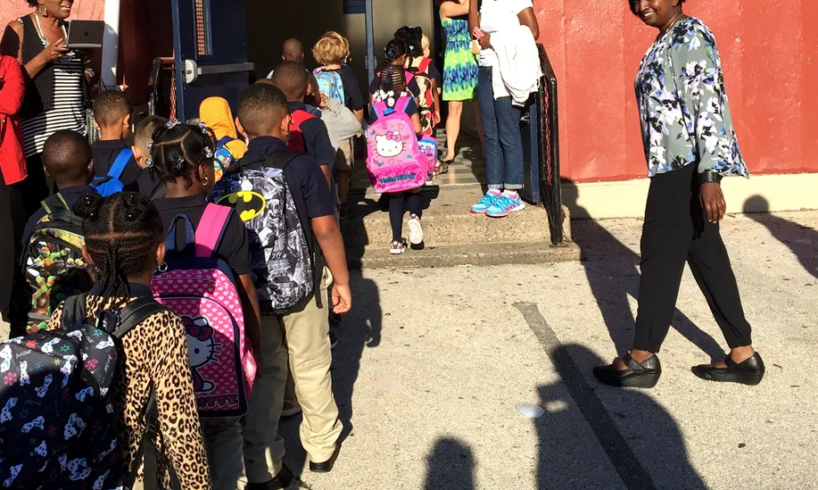
The University of Pennsylvania will provide more than $4 million to a West Philadelphia elementary school in a deal with the school district and teachers union that is attracting both excitement and scrutiny from parents, teachers, and observers.
Penn will work with Henry C. Lea Elementary School, Principal Aaron Grewer, and the community to make sure the plan fits Lea’s needs, said Caroline Watts, director of school and community engagement at Penn’s Graduate School of Education. Details will be worked out in a partnership that includes the community, she said in an interview.
The Philadelphia School Board at its Jan. 27 meeting authorized Superintendent William Hite to negotiate the agreement, which is valued at $816,500 per academic year.
Some in the community were wary about the partnership, in part because of the impact of a similar relationship between Penn and nearby Penn Alexander School. Lea parent Phil Gentry said he’s particularly concerned about the district’s statement that it wants to “emulate” that arrangement. Home prices in that catchment area have risen in recent years, and some students have been unable to stay, Gentry said in an interview ahead of the school board meeting.
“We see the experiment with Penn Alexander as not so much a success to be emulated, given that it involves radically gentrifying the neighborhood,” he said. “We’re concerned about this precedent of private institutions steering money toward the schools that benefit their own interests.”
Watts said Penn hears the concerns of the community, and pointed out that Lea is a “very different model” from Penn Alexander.
Penn Alexander, at 42nd and Spruce streets, was founded in 2001 as a partnership with Penn, the school district, and the Philadelphia Federation of Teachers with the stated aim of becoming “a model university-assisted, K-8 public school for West Philadelphia children.”
Lea, meanwhile, has a long history in the neighborhood. About 500 students in prekindergarten through eighth grade attend the school on 47th and Locust, and 100% of them come from families that receive state or federal assistance, according to district data. At Penn Alexander, that figure is 46%, according to the district.
“Lea has been a cornerstone of the community for over 100 years,” Watts said.
Penn has been involved with Lea since 2013, and the school has been making strides since then, said Watts. “We want to continue to maintain that progress” with a new five-year plan, she said.
Gerwer’s vision is a “student-centered, inquiry-based, project-based learning model,” with equity at the center, Watts said. The funds, she said, will help provide resources including literacy and math coaches and counseling services for students and staff. The Responsive Math Teaching program at the school is part of that, she said.
Lea’s principal has begun holding a series of meetings with parents and the community to outline his goals. “Those meetings are about getting their feedback and perspective on what they want the school to become and how they want the resources to feed into that vision” of a “student-centered, inquiry-based” learning model, Watts said.
Gentry said he’s looking for “robust community engagement” and reassurance that the school will continue to provide resources for English as a second language and for special needs students.
“These sorts of charity investments always come with strings attached,” Gentry said. But “our school needs resources, and we can’t afford to say no to this sort of money,” he said.
Watts stressed that Gerwer “is concerned about equity for all students, and equity for all kinds of students” including students with disabilities and those from immigrant families.
The school district said the arrangement will seek to “bring greater innovation and flexibility to school operations, to further improve instruction and school culture, and to provide additional staffing and other supports.” Goals include improving student achievement, appreciation for diversity, and professional development for teachers, according to the district. The plan also aims to study ways to improve “instructional and curricular programs and practices,” the district said.
Penn has faced criticism in the past for choosing not to make payments in lieu of taxes, or PILOTs, to Philadelphia schools. “Students at Lea deserve a quality education, and students at every school in the public school system in Philadelphia deserve quality education,” said Amy C. Offner, associate professor in Penn’s history department and a member of Penn for PILOTs, a group of Penn faculty and staff that advocates the PILOT arrangement.
If Penn were to pay 40% of what it would pay in taxes if it were not tax exempt, it could add $40 million a year to the school system by putting money into the city’s annual budget, Offner said in an interview. Penn for PILOTS has not taken a position on the Lea investment.
The agreement also envisions “undertaking research that will facilitate the opportunity to replicate and scale this model over the next five years,” according to a school district document.
The district will report on progress once a year, starting June 30.
Hite, in a statement issued by the university, said the funds will enable the school “to create more innovative and flexible learning opportunities for students” and provide “staffing and other supports.”
This article was originally posted on Penn to invest $4 million in West Philly’s Lea Elementary, says it will work with community